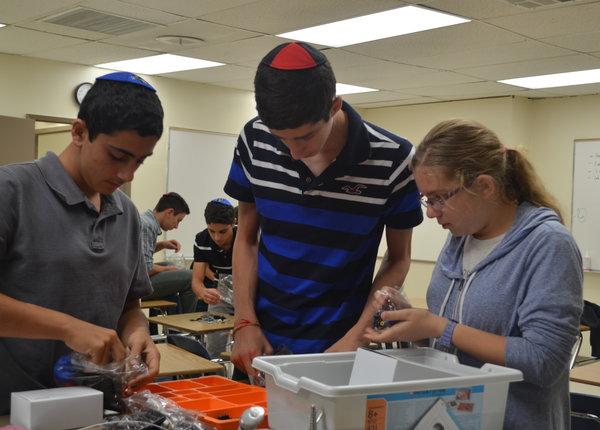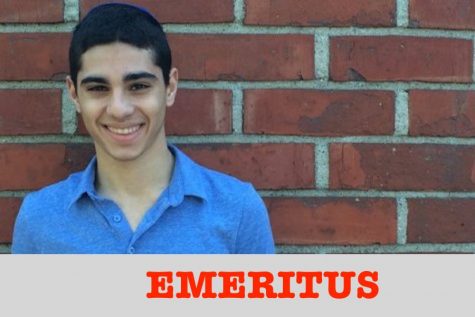New tech classes draw 27 students after school

LAB: From left, Kian Marghzar, Mark Miller and Eliana Hjortzberg Litov at CIJE Sept. 12
October 4, 2013
Believe it or not, 4:20 dismissal is apparently too early for 27 freshmen and sophomores. They’ve signed up for Shalhevet’s new Sci-Tech-Engineering course, which meets for 90 minutes at a time, two days a week, after school.
That’s nearly double the number of students who were expected for the class, and so now two sections have been scheduled instead of one.
“We want anyone who is interested in this program to sign up,” said Science Department chair Dr. Jay Smallwood in an email sent to sophomores in August.
“You do not have to be an engineer,” Dr. Smallwood said. “The results of this program are phenomenal and as such the demand in the schools that have this program far exceeds the capacity.”
Offered exclusively to freshmen and sophomores, the course is being taught by Dr. Smallwood and Rabbi David Stein, who has an engineering degree from Columbia University in addition to his rabbinical ordination.
Though meeting after school, the course will be graded and will count for credit on students’ transcripts. According to Dr. Smallwood, it will be more complicated and time-consuming than the robotics club, which started last year for all grades.
There will be no tests, Dr. Smallwood and Rabbi Stein said. That’s because the goal of the course is for students to collaborate and develop complex technology, mainly in electronics, with minimal guidance from teachers.
Projects will be the major component of students’ grades. Participants will be expected to work outside of school as well during class, Rabbi Stein said in an interview, and in groups of three, they will learn the importance of teamwork by figuring out the best strategy to tackle whatever the project is.
“There are so many different project possibilities,” Rabbi Stein said. “As a team, you must identify how to solve the problem using circuits, robotics and programming.”
The new course is officially called the CIJE-Tech High School Engineering Program. It’s being funded by the Center for Initiatives in Jewish Education – CIJE – a non-profit organization based in New York which finances courses dealing with science and technology in Jewish schools.
With nine schools on the East Coast, this year CIJE branched out to the West Coast, adding funding for six other Jewish schools along with Shalhevet including YULA, Valley Torah and New Community Jewish High School (New Jew).
The Center receives donations from across the country to provide Jewish students with a focus on “STEM,” the acronym used by scientists for Science, Technology, Engineering, and Mathematics.
“We have known about this program for a while now and are very excited to add the T and E in STEM,” Dr. Smallwood said.
During the first week of school, CIJE students were already given a taste of teamwork, as they were assigned to groups to both build and actually program a LEGO robot.
The original plan was for the class to have 15 students and meet Mondays and Thursdays for an hour each, with a third hour rotating between SWAP and P.E.
But 15 sophomores and 14 freshmen were interested, so school officials successfully acquired an additional boost of donations from anonymous Shalhevet donors to fund a second section. In the end, 27 enrolled.
Dr. Smallwood then split the course into two separate classes, one meeting on Mondays and Wednesdays for 90 minutes each, and the other class on Tuesdays and Thursdays. Students could decide which days were more convenient for their schedule. In the end, 27 enrolled.
“By offering two sections,” Dr. Smallwood said in an email through Schoology, “we not only get to involve more students, but also provide more flexibility for participation in other co-curriculars.”
Engineering experience wasn’t necessary to join the class, but students had to be committed and prepared to be challenged in order to join. They also had to meet with Dr. Smallwood and Rabbi Stein and answer questions, which varied from why they wanted to join to if they had any related skills, abilities or hobbies – or, as Dr. Smallwood put it, “any nerdy things,” like computer programming or building things.
“The interview wasn’t too stressful and was pretty easy going,” sophomore Daniella Banafsheha said. “They asked me about my hobbies and I said reading.”
The program is designed to be a two-year course, and is still considered to be a co-curricular as well because it meets after school.
Freshman Jonah Kaye thinks this will be both a fun and educational opportunity.
“I love math and science,” Jonah said. “This program can enhance my skills and I’m very excited to do it.”
Related: CIJE class demonstrates its first robots at Town Hall













